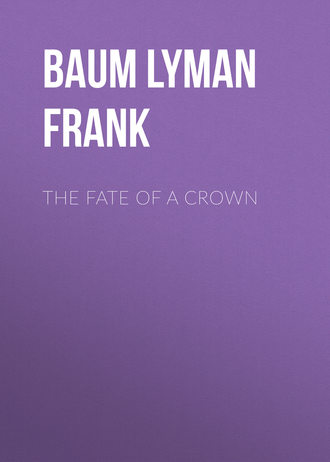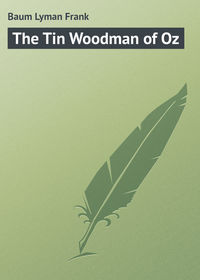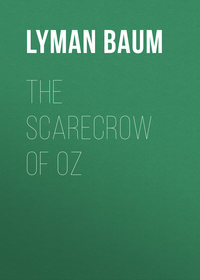 полная версия
полная версияThe Fate of a Crown
I reached the railway station without difficulty and found I had a quarter of an hour to spare.
“Give me a ticket to Cuyaba,” I said to the clerk at the window.
He stared at me as he handed the card through the grating.
“Matto Grosso train, senhor,” he said. “It leaves at eight o’clock.”
“Thank you,” I returned, moving away.
A tall policeman in an odd uniform of black and gold barred my way.
“Your pardon, senhor Americano,” said he, touching his visor in salute; “I beg you to follow me quietly.”
He turned on his heel and marched away, and I, realizing that trouble had already overtaken me, followed him to the street.
A patrol was drawn up at the curb, a quaint-looking vehicle set low between four high wheels and covered with canvas. Startled at the sight I half turned, with a vague idea of escape, and confronted two stout policemen at my rear.
Resistance seemed useless. I entered the wagon, my captor seating himself upon the bench beside me. Instantly we whirled away at a rapid pace.
I now discerned two men, also in uniform, upon the front seat. One was driving the horses, and presently the other climbed over the seat and sat opposite my guard.
The tall policeman frowned.
“Why are you here, Marco?” he demanded, in a threatening voice.
“For this!” was the prompt answer; and with the words I caught a quick flash as the man called Marco buried a knife to the hilt in the other’s breast.
My captor scarce uttered a sound as he pitched headforemost upon the floor of the now flying wagon. The driver had but given a glance over his shoulder and lashed his horses to their utmost speed.
Cold with horror at the revolting deed I gazed into the dark eyes of the murderer. He smiled as he answered my look and shrugged his shoulders as if excusing the crime.
“A blow for freedom, senhor!” he announced, in his soft, native patois. “Dom Miguel would be grieved were you captured by the police.”
I started.
“Dom Miguel! You know him, then?”
“Assuredly, senhor. You are the new secretary. Otherwise you would not be so foolish as to demand a ticket to Cuyaba – the seat of the revolution.”
“I begin to understand,” I said, after a moment’s thought. “You are of the police?”
“Sergeant Marco, senhor; at your service. And I have ventured to kill our dear lieutenant in order to insure your safety. I am sorry,” he added, gently touching the motionless form that lay between us; “the lieutenant was a good comrade – but a persistent royalist.”
“Where are you taking me?” I asked.
“To a suburban crossing, where you may catch the Matto Grosso train.”
“And you?”
“I? I am in no danger, senhor. It is you who have done this cruel deed – and you will escape. The driver – a true patriot – will join me in accusing you.”
I nodded, my horror of the tragedy growing each moment. Truly this revolutionary party must be formed of desperate and unscrupulous men, who hesitated at no crime to advance their interests. If the royalists were but half so cruel I had indeed ventured into a nest of adders. And it was the thought of Valcour’s confessed purpose to murder me on shipboard that now sealed my lips from a protest against this deed that was to be laid upon my shoulders.
Presently the wagon slowed up, stopping with a jerk that nearly threw me from my seat. The sergeant alighted and assisted me to follow him.
We were at a deserted crossing, and the buildings of the city lay scattered a quarter of a mile away.
“Take this flag, senhor. The engineer will stop to let you aboard. Farewell, and kindly convey my dutiful respects to Dom Miguel.”
As the wagon rolled away the train came gliding from the town, and I stepped between the tracks and waved the flag as directed. The engine slowed down, stopped a brief instant, and I scrambled aboard as the train recovered speed and moved swiftly away.
For the present, at least, I was safe.
Quite unobtrusively I seated myself in the rear end of the passenger coach and gazed from the window as we rushed along, vainly endeavoring to still the nervous beating of my heart and to collect and center my thoughts upon the trying situation in which I found myself. Until the last hour I had been charmed with my mission to Brazil, imagining much pleasure in acting as secretary to a great political leader engaged in a struggle for the freedom of his country. The suggestion of danger my post involved had not frightened me, nor did it even now; but I shrank from the knowledge that cold-blooded assassination was apparently of little moment to these conspirators. In less than two hours after landing at Rio I found myself fleeing from the police, with a foul and revolting murder fastened upon me in the name of the revolution! Where would it all end? Did Uncle Nelson thoroughly realize the terrible nature of the political plot into which he had so calmly thrust me? Probably not. But already I knew that Brazil was a dangerous country and sheltered a hot-headed and violent people.
It was a long and dreary ride as we mounted the grade leading to the tablelands of the interior. Yet the country was beautifully green and peaceful under the steady glare of the sun, and gradually my distress passed away and left me more composed.
Neither the passengers nor trainmen paid the slightest attention to me, and although at first I looked for arrest at every station where we halted, there was no indication that the police of Rio had discovered my escape and flight.
Night came at last, and I dozed fitfully during the long hours, although still too nervous for sound sleep. We breakfasted at a way-station, and a couple of hours later, as I was gazing thoughtfully out the window, the conductor aroused me by settling into the seat at my side. He was a short, pudgy individual, and wheezed asthmatically with every breath.
“I received a telegram at the last station,” he confided to me, choking and coughing between the words. “It instructed me to arrest an American senhor traveling to Cuyaba. Have you seen him?”
I shivered, and stared back into his dull eyes.
“Ah! I thought not,” he continued, with a short laugh. “It is not the first telegram they have sent this trip from Rio, you know; but I cannot find the fellow anywhere aboard. Do you wonder? How can I be expected to distinguish an American from a Brazilian? Bah! I am not of the police.”
I began to breathe again. The conductor nudged my ribs with his elbow.
“These police will perhaps be at the station. Cuyaba is the next stop. But we will slow up, presently, at a curve near the edge of the forest. Were I the American, and aboard this train, I would get out there, and wait among the trees in the forest until Dom Miguel’s red cart comes along. But, ai de mim, the American is not here! Eh? Thank God for it! But I must leave, senhor. Good day to you.”
He bustled away, and at once I seized my traveling-bag and slipped out to the back platform. We slowed up at the curve a moment later, and I sprang to the ground and entered the shade of a group of trees that marked the edge of the little forest.
And there I sat upon a fallen tree-trunk for two weary hours, wondering what would happen next, and wishing with all my heart I had never ventured into this intrigue-ridden country. But at the end of that time I heard the rattle of a wagon and the regular beat of a horse’s feet.
Peering from my refuge I discerned a red cart slowly approaching over the road that wound between the railway track and the forest. It was driven by a sleepy Brazilian boy in a loose white blouse and a wide straw hat.
As he arrived opposite me I stepped out and hailed him.
“Are you from Dom Miguel de Pintra?” I asked.
He nodded.
“I am the American he is expecting,” I continued, and climbed to the seat beside him. He showed no surprise at my action, nor, indeed, any great interest in the meeting; but as soon as I was seated he whipped up the horse, which developed unexpected speed, and we were soon rolling swiftly over the country road.
CHAPTER IV
THE CHIEFTAIN
The province of Matto Grosso is very beautiful, the residences reminding one greatly of English country estates, except that their architecture is on the stiff Portuguese order. At least a half-mile separated the scattered mansions from one another, and the grounds were artistically planned and seemingly well cared for. At this season the rich, luxuriant foliage of Brazil was at its best, and above all brooded a charming air of peace that was extremely comforting after my late exciting experiences. We met few people on the way, and these were peasants, who touched their hats respectfully as we passed.
We had driven some five miles when we came to an estate rather more extensive than its neighbors, for the hedge of blooming cactus that divided the grounds from the roadway ran in an unbroken line as far as the eye could reach.
However, we came to a gateway at last and turned into the grounds, where magnificent trees shaded a winding drive ascending to the fine old mansion of de Pintra.
A man stood upon the porch shading his eyes with his hand and gazing at us as we approached. When I alighted from the cart he came down the steps to meet me, bowing very courteously, and giving my hand a friendly pressure. No other person was in sight, and the red cart had disappeared around the corner of the house.
“You are welcome, sir,” he said, in a quiet but most agreeable voice. “You come from my friend Nelson Harcliffe? That was my thought.” He paused to give me a keen look, and then smiled – a sweet, winning smile such as I have seldom seen. “Ah! may you not be a Harcliffe yourself? Your features seem quite familiar. But, pardon me, sir; I have not introduced myself. I am Miguel de Pintra.”
I fear I stared at him with somewhat rude intentness, for Dom Miguel was a man to arouse interest in any beholder. Tall, spare, but not ungraceful, his snow-white hair and beard made strong contrast with his bronzed features. His eyes, soft and gentle in expression, were black. His smile, which was not frequent, disclosed a line of even, white teeth. His dress was a suit of plain, well-fitting black, supplemented by irreproachable linen. Taken altogether, Dom Miguel appeared a model of the old school of gentility, which may be as quickly recognized in Brazil as in England, France or America. Indeed, it seemed an absurdity to connect this eminently respectable personage with revolutions, murders, and intrigue, and my spirits rose the moment I set eyes upon his pleasant face.
“I am Robert Harcliffe,” said I, answering the question his politeness would not permit him to ask; “the son of Marshall Harcliffe.”
A flash of surprise and delight swept over his dark face. He seized both my hands in his own.
“What!” he cried, “Nelson Harcliffe has sent me his own nephew, the son of my dear old friend? This is, indeed, a rare expression of loyalty!”
“I thought you knew,” I rejoined, rather embarrassed, for the fathomless eyes were reading me with singular eagerness.
“I only knew that Nelson Harcliffe would respond promptly to my requests. I knew that the Castina would bring my secretary to Brazil. But whom he might be I could not even guess.” He paused a moment, to continue in a graver tone: “I am greatly pleased. I need a friend – a faithful assistant.”
“I hope I may prove to be both, sir,” I returned, earnestly. “But you seem not to lack loyal friends. On my way hither from Rio de Janiero I have been protected more than once, doubtless by your orders.”
“Yes; the cause has many true adherents, and I notified our people to expect an American gentleman on the Castina and to forward him to me in safety. They know, therefore, that you came to assist the Revolution, and it would have been strange, indeed, had the royalists been able to interfere with you.”
“Your party is more powerful than I had suspected,” I remarked, thinking of my several narrow escapes from arrest.
“We are only powerful because the enemy is weak,” answered Dom Miguel, with a sigh. “Neither side is ready for combat, or even an open rupture. It is now the time of intrigue, of plot and counterplot, of petty conspiracies and deceits. These would discourage any honest heart were not the great Cause behind it all – were not the struggle for freedom and our native land! But come; you are weary. Let me show you to your room, Robert Harcliffe.”
He dwelt upon the name with seeming tenderness, and I began to understand why my father and my stern Uncle Nelson had both learned to love this kindly natured gentleman of Brazil.
He led me through cool and spacious passages to a cozy room on the ground floor, which, he told me, connected by a door with his study or work-room.
“I fear my trunks have been seized by the government,” said I, and then related to him the details of my arrest and the assassination of the police lieutenant.
He listened to the story calmly and without interruption; but when it was finished he said:
“All will be reported to me this evening, and then we will see whether your baggage cannot be saved. There were no papers that might incriminate you?”
“None whatever.”
Then I gave him the story of Valcour, or de Guarde, and he smiled when I related the manner in which the fellow had been deceived.
“I knew that Valcour had been dispatched to intercept my secretary,” said he, “and you must know that this personage is not an ordinary spy, but attached to the Emperor himself as a special detective. Hereafter,” he continued, reflectively, “the man will be your bitter enemy; and although you have outwitted him once he is a foe not to be despised. Indeed, Harcliffe, your post is not one of much security. If, when I have taken you fully into our confidence, you decide to link your fortunes to those of the Revolution, it will be with the full knowledge that your life may be the forfeit. But there – we will speak no more of business until after dinner.”
He left me, then, with many cordial expressions of friendship.
A servant brought my luncheon on a tray, and after eating it I started for a stroll through the grounds, enjoying the fragrance and brilliance of the flowers, the beauties of the shrubbery, and the stately rows of ancient trees. The quiet of the place suggested nothing of wars and revolutions, and it was with real astonishment that I reflected that this establishment was the central point of that conspiracy whose far-reaching power had been so vividly impressed upon me.
Engaged in this thought I turned the corner of a hedge and came face to face with a young girl, who recoiled in surprise and met my gaze with a sweet embarrassment that caused me to drop my own eyes in confusion.
“Your pardon, senhorita!” I exclaimed, and stood aside for her to pass.
She nodded, still searching my face with her clear eyes, but making no movement to proceed. I noted the waves of color sweeping over her fair face and the nervous tension of the little hands that pressed a mass of flowers to her bosom. Evidently she was struggling for courage to address me; so I smiled at her, reassuringly, and again bowed in my best manner, for I was not ill pleased at the encounter.
I have always had a profound reverence for woman – especially those favored ones to whom Nature has vouchsafed beauty in addition to the charm of womanhood. And here before me stood the most beautiful girl I had ever seen, a type of loveliness more sweet and delightful than any I had even dreamed could exist.
It was my fate to recognize this in the moments that I stood watching her lips tremble in the endeavor to form her first words to me.
“You are the American?” she asked, finally.
“Assuredly, donzella. Permit me to introduce myself. I am Robert Harcliffe.”
“My uncle expected you,” she said, shyly.
“Your uncle?”
“Dom Miguel is not really my uncle,” answered the girl; “but he permits me to call him so, since he is my guardian. Yet it was not from him I learned of your arrival, but from Francisco, who traveled from Rio on the same train.”
My face doubtless showed that I was puzzled, for she added, quickly:
“Francisco is my brother, senhor. We are both devoted heart and soul to the Cause. That is why I felt that I must speak with you, why I must welcome you to our fellowship, why I must implore you to be strong and steadfast in our behalf!”
I smiled at the vehemence that had vanquished her former hesitation, and to my delight her exquisite face lighted with an answering smile.
“Ah, you may laugh at me with impunity, senhor Americano, for I have intuitions, and they tell me you will be faithful to the cause of freedom. Nay, do not protest. It is enough that I have read your face.”
With this she made a pretty courtesy and vanished around the hedge before I could summon a word to detain her.
It is astonishing to what an extent this encounter aroused my enthusiasm for “the Cause.” Heretofore I had regarded it rather impersonally, as an affair in which I had engaged at the request of my good uncle. But now that I had met this fellow-conspirator and gazed into the enchanting depths of her eyes, I was tremendously eager to prove my devotion to the cause of freedom.
True, I had seen the girl but a few moments. Even her name was unknown to me. But she was a rebel; Francisco, her brother, was a rebel; and Dom Miguel permitted her to call him “uncle.” Very good; very good, indeed!
When I returned to my room I was surprised to find my trunks there, they having arrived in some mysterious way during my brief absence.
I dressed for dinner and found my way to the drawing-room, where my host – or my employer, rather – was conversing with a lady and a gentleman.
There was no reason my heart should give that bound to warn me; no one could fail to recognize that slender, graceful figure, although it was now enveloped in dainty folds of soft white mulle. But she had no intention of allowing her chance meeting to stand for a formal introduction, and as Dom Miguel presented me she shot a demure yet merry glance at me from beneath her long lashes that might readily have effected my conquest had I not already surrendered without discretion.
“The Senhorita Lesba Paola,” announced de Pintra, speaking the name with evident tenderness. Then he turned to the man. “Senhor Francisco Paola,” said he.
Francisco Paola puzzled me at that first meeting nearly as much as he did later. His thin form was dressed in a dandified manner that was almost ludicrous, and the fellow’s affectation was something amazing. Somewhat older than his bewitching sister, his features were not without a sort of effeminate beauty, of which he seemed fully aware. At once I conceived him to be a mere popinjay, and had no doubt he would prove brainless and well-nigh insufferable. But Dom Miguel introduced Paola with grave courtesy and showed him so much deference that I could not well be ungracious to the young dandy. Moreover, he had a stronger claim to my toleration: he was Lesba’s brother.
Scarcely were these introductions complete when another lady entered the room. She gave a slight start at sight of me, and then advanced gracefully to Dom Miguel’s side.
“My daughter, Mr. Harcliffe; Senhora Izabel de Mar,” said he, and gave me a curious glance that I could not understand.
I looked at Madam Izabel and lowered my eyes before the cold and penetrating stare I encountered. She was handsome enough, this woman; but her features, however regular, were repellant because of their absolute lack of expression – a lack caused by repression more than a want of mobility. Her face seemed carved of old ivory. Even the great eyes were impenetrable, reflecting nothing of the emotions that might dwell within. I found myself shivering, and although I sincerely tried to be agreeable to Dom Miguel’s daughter, the result was little more than farcical.
My sudden appearance in the household had evidently caused Madam Izabel surprise; perhaps it annoyed her, as well. But she drew me to a seat beside her and plied me with questions which I was at a loss how to answer, in view of the supposedly private nature of my mission to Brazil. Inwardly I blamed Dom Miguel for not telling me how far his daughter and his guests were in his confidence; but before I blundered more than a few aimless sentences a light voice interrupted us and Francisco Paola leaned over Madam Izabel’s chair with a vapid compliment on the lady’s charms and personal appearance that was fairly impertinent in its flippancy.
The look she gave him would have silenced an ordinary man; but Senhor Francisco smiled at her frown, took the fan from her hand, and wielded it in a mincing manner, pouring into her unwilling ears a flood of nonsense that effectually cut me out of the conversation.
Dom Miguel came to my relief by requesting me to take the younger lady in to dinner, and to my surprise Madam Izabel took Paola’s arm without apparent reluctance and followed us to the dining-room.
The repast would have been, I fear, rather stupid, but for Senhor Francisco’s ceaseless chatter. To my great disappointment the donzella Lesba Paola appeared exceedingly shy, and I could scarce recognize in her my eager questioner of the afternoon. De Pintra, indeed, courteously endeavored to draw the ladies into a general conversation; but his daughter was cold and unresponsive, and the host himself appeared to be in a thoughtful mood. For my part, I was glad to have the fop monopolize the conversation, while I devoted my attention to the silent girl beside me; but it was evident that a general feeling of relief prevailed when the ladies returned to the drawing-room and left us to our cigars and wine.
When the servants had been dismissed and we three men were alone, Dom Miguel addressed me with unrestrained frankness.
“I suppose you know little of our revolutionary movement, Mr. Harcliffe,” he began.
“Very little, indeed,” I responded, briefly.
“It dates back for several years, but has only recently attained to real importance. Gradually our people, of all degrees, have awakened to the knowledge that they must resist the tyranny of the imperial government, with its horde of selfish and unscrupulous retainers. The Emperor is honest enough, but weak, and his advisors leave him no exercise of his own royal will. Spurred by the nation’s distress, the Revolution has at last taken definite form, and at present centers in me. But as our strength grows our danger increases. The existing government, knowing itself threatened, has become keen to ferret out our secrets and to discover the leaders of the Cause, that they may crush all with one blow.” He paused, and flicked the ash from his cigar with a thoughtful gesture. “For this, and many another reason, I need the assistance of a secretary whom I may trust implicitly – who will, if need be, die rather than betray my confidence.”
I glanced hesitatingly at the man opposite me. It seemed strange that Dom Miguel should speak of these personal matters before a third party.
Paola was trying to balance a spoon upon the edge of his glass. He met my gaze with the usual vacant smile upon his face, yet in the instant I caught a gleam in his eye so shrewd and comprehensive that it positively startled me. Instantly his face was shrouded in a cloud of smoke from his cigar, and when it cleared away the idiotic leer that appeared upon his countenance indicated anything rather than intelligence.
Dom Miguel looked from one to the other of us and smiled.
“Perhaps I should tell you,” said he, earnestly, “that no man is higher in our counsels or more thoroughly esteemed by all classes of patriots than Francisco Paola. You may speak in his presence with entire freedom.”
At this the popinjay twisted the end of his moustache and bowed with mock dignity. I stared at him with an astonishment tinged with disgust. His eyes were now glassy and his gaze vacuous. The eternal smile expressed merely stupidity and conceit.
I turned to Dom Miguel, who gravely awaited my reply.
“Sir,” said I, “you are my father’s old friend. My uncle, who was my father’s partner and is now my own associate in business, sent me to you with the injunction to serve you to the best of my ability. This, by way of gratitude for many favors shown our house by you in the days when a friend counted largely for success. Being an American, I love freedom. Your cause shall be my cause while I remain with you. Of my power to serve you there may be question; but my loyalty you need never doubt.”











